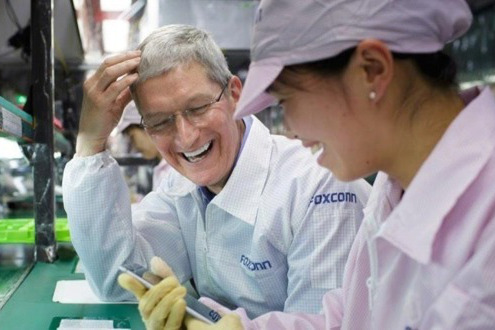Foxconn claims it can make all of Apple's iPhones outside China
Foxconn has told investors that it has the capacity to produce iPhones for the American market without using its Chinese facilities, potentially skirting possible US/China trade tariffs.

Tim Cook visiting a Foxconn plant in China
Specifically, a senior executive says that Foxconn can make enough iPhones to supply the entire US market and do so out in territories that would avoid incurring any US/China tariffs.
According to Bloomberg, Young Liu, semiconductor division chief at Hon Hai, also known as Foxconn, was speaking at an investor briefing in Taipei.
"Twenty-five percent of our production capacity is outside of China," he said, "and we can help Apple respond to its needs in the US market. We have enough capacity to meet Apple's demand."
Liu confirmed that Apple has not requested such a move yet, nor did he detail which Foxconn facilities might be used after such a move. He was telling investors that Foxconn is able to move quickly and change its use of facilities in different countries to avoid such trade wars.
Foxconn has previously been investigating moving iPhone production to India and to Vietnam.
Bloomberg says that Liu gave Foxconn's decision to build a base in Wisconsin as an example of its worldwide production capability. That operation has been controversially delayed and changed but other company executives reportedly reaffirmed Foxconn's commitment to the US state.
It plans to hire up to 2,000 people by the end of 2020, though this is is substantially fewer than the 13,000 originally promised.

Tim Cook visiting a Foxconn plant in China
Specifically, a senior executive says that Foxconn can make enough iPhones to supply the entire US market and do so out in territories that would avoid incurring any US/China tariffs.
According to Bloomberg, Young Liu, semiconductor division chief at Hon Hai, also known as Foxconn, was speaking at an investor briefing in Taipei.
"Twenty-five percent of our production capacity is outside of China," he said, "and we can help Apple respond to its needs in the US market. We have enough capacity to meet Apple's demand."
Liu confirmed that Apple has not requested such a move yet, nor did he detail which Foxconn facilities might be used after such a move. He was telling investors that Foxconn is able to move quickly and change its use of facilities in different countries to avoid such trade wars.
Foxconn has previously been investigating moving iPhone production to India and to Vietnam.
Bloomberg says that Liu gave Foxconn's decision to build a base in Wisconsin as an example of its worldwide production capability. That operation has been controversially delayed and changed but other company executives reportedly reaffirmed Foxconn's commitment to the US state.
It plans to hire up to 2,000 people by the end of 2020, though this is is substantially fewer than the 13,000 originally promised.

Comments
Apple roughly ships 200M iPhone, 100M of those are not the latest, i.e iPhone 8 and below. Foxconn in India already has the ability to assemble those phones if and when needed. It is only a matter of scale.
US has roughly 30% of Apple's revenue, so assuming in perfect scale ( which won't be the case but for the sake of numbers ), Foxconn will need to assemble 15M older generation iPhone and 15M latest iPhone outside of China.
Sad and scary.
Just find one of those estimates from Gartner, IDC, etc. and look at their yearly US sales estimates. That's approximately how many phones Foxconn would need to assemble outside of China. It's going to be more than 30M
However, China is playing the long game since they know US policies move with the political winds, and they making a bet they in 18 months things will be different. Even if 18 month turns into 5 yrs they still in the long game and do not care if their economy suffers. Xi Jinping will be there long after the US political winds switch direction multiply times.
Of course Foxconn was not talking about U.S. manufacturing but Indonesia, India, Vietnam, etc. I read an article about how China is skirting around the tariffs by sticking “Made in Vietnam” on stuff, Vietnam being a Chinese satellite and also a communist totalitarian state.
We we have an inflated value of ourselves, but our GDP was much smaller when we were isolated. The major drivers of our economy are multinational companies that make stuff and provide services that the world needs, not just the US.
The people of China were a different story. But the party-controlled government of China is very dangerous. They are the last people in the world I'd want to give leverage or the keys to communications.